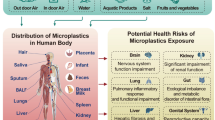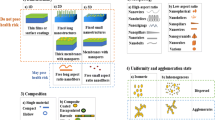Abstract
Background, Aim and Scope
Perfluorooctane sulfonate (PFOS; C8F17SO3-) is a fully fluorinated organic compound which has been manufactured for decades and was used widely in industrial and commercial products. The recent toxicological knowledge of PFOS mainly concerns mono-substance exposures of PFOS to biological systems, leaving the potential interactive effects of PFOS with other compounds as an area where understanding is significantly lacking. However, a recent study, reported the potential of PFOS to enhance the toxicity of two compounds by increasing cell membrane permeability. This is of particular concern since PFOS has been reported to be widely distributed in the environment where contaminants are known to occur in complex mixtures. In this study, PFOS was evaluated alone and in combination with cyclophosphamide (CPP) to investigate whether a presence of PFOS leads to an increased genotoxic potential of CPP towards hamster lung V79 cells. Genotoxicity was investigated using the micronucleus (MN) assay according to the recent draft ISO/DIS 21427-2 method. PFOS alone demonstrated no genotoxicity up to a concentration of 12.5 mg/L. However, PFOS combined with two different concentrations of CPP, with metabolic activation, caused a significant increase in the number of micronucleated cells compared to treatments with CPP only. These results provide a first indication that PFOS has the potential to enhance the genotoxic action of CPP towards V79 cells, suggesting that together with the alterations in cell membrane properties shown previously, that genotoxicity of complex mixtures may be increased significantly by changes in chemical uptake. Together with an earlier study performed by the own working group it can be concluded that PFOS alone is not genotoxic in this bioassay using V79 cells up to 12.5 mg/L, but that further investigations are needed to assess the potential interaction between PFOS and other substances, in particular regarding the impact of membrane alterations on the uptake of toxic substances. Materials and Methods: - Results: - Discussion: - Conclusions: - Recommendations and Perspectives: -
Similar content being viewed by others
Author information
Authors and Affiliations
Corresponding authors
Rights and permissions
About this article
Cite this article
Färber, H., Jones, P., Giesy, J. et al. Perfluorooctane Sulfonate Increases the Genotoxicity of Cyclophosphamide in the Micronucleus Assay with V79 Cells: Further Proof of Alterations in Cell Membrane Properties Caused by PFOS (3 pp). Env Sci Poll Res Int 14, 85–87 (2007). https://doi.org/10.1065/espr2007.01.384
Received:
Accepted:
Published:
Issue Date:
DOI: https://doi.org/10.1065/espr2007.01.384




